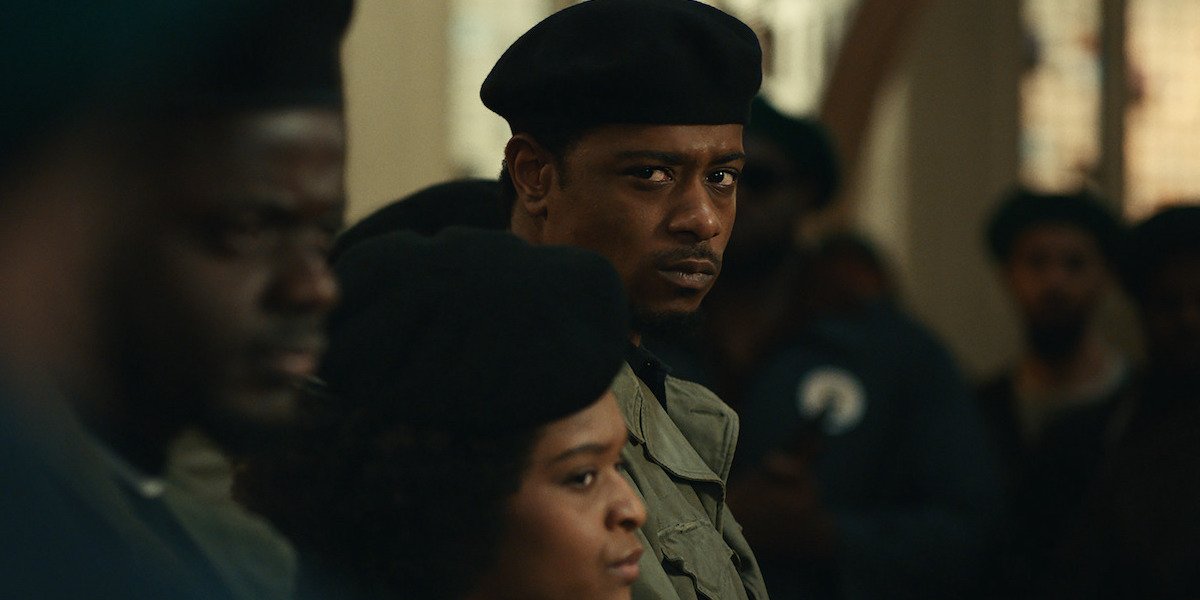Why Judas And The Black Messiah's Writers Weren't Worried About Spoiling Anything With The Title

Whether part of the Christian faith or not, most people are familiar with the biblical story of Jesus. Even those unfamiliar with the details surrounding the death of Jesus are aware that he died, so it might seem strange that Judas and the Black Messiah was titled the way that it is. From these words alone, we know there will be two main characters and that the latter will die, but it turns out the writers weren’t worried about spoiling anything with this decision.
Judas and the Black Messiah tells the true story of William O’Neal (played by LaKeith Stanfield), an FBI informant who infiltrates the Illinois chapter of the Black Panther Party to take down Chairman Fred Hampton (played by Daniel Kaluuya). The screenplay was written by Will Berson and Shaka King from the story written by Keith and Kenny Lucas. I got to chat with the Lucas Brothers for an interview with CinemaBlend. We discussed how hard the title hits for those who grew up in church and how it also gives away the ending, but they weren't worried about that. Here’s what Kenny Lucas shared:
We grew up in the church, Southern Baptist, so we’re very, very familiar with the Jesus story, the narrative, and it was always something in the back of our heads. When we originally wrote our treatment, we titled it “The Rise of the Black Messiah” because we wanted it to really hit home that this is an examination of COINTELPRO and how the state works individuals viewed with any danger much like the Roman empire was against Jesus. History sort of presented us with the perfect parallel to that story. And we felt like when you read the title of “Judas and the Black Messiah” you know what you're going into a bit, the endings already - we know that they killed Fred. We already know that. But to know that we're entering the story through Judas’s perspective, I think it adds even more for the biblical nature of the film. It makes it more epic.
Epic is probably the best word I can think of to sum up Judas and the Black Messiah. For those unfamiliar, COINTELPRO is an abbreviation derived from COunter INTELligence PROgram, a series of covert and illegal projects the United States FBI set up to discredit and neutralize American political organizations. Judas and the Black Messiah examines this by telling the story through William O’Neal’s point of view. He was offered a plea deal to infiltrate the Black Panther Party in exchange for keeping himself out of prison.
You’ll notice Kenny Lucas mentioned the film is told from Judas’s perspective - Judas being Jesus’s friend who betrayed him and ultimately led Jesus into the hands of his enemy. So William O’Neal is Judas in Judas in the Black Messiah. Jesus is also referred to as the Messiah, meaning “promised deliverer” as he was promised to deliver his people from sin, and the parallel with Judas and the Black Messiah is that Fred Hampton was leading his community in a movement to stand together, speak out and take action against harmful government treatment.
The Bible provides the story of Jesus through the eyes of his friends and family, but not through the eyes of Judas. Watching the story of Fred Hampton unfold not through his own eyes but from William O’Neal’s perspective provides an extra layer of introspection. It’s not as simple as labeling O’Neal the villain of the story. There are many points where it’s questionable if he’s even a bad guy at all.
I really like to go into a new film blind, and I was still able to do that with Judas and the Black Messiah. Like the Lucas Brothers, I’m very familiar with the narrative of Jesus and understood that the film would end in Fred Hampton’s death, but I was not familiar with the story of Fred Hampton. Knowing where the film was headed didn’t make it feel slow or impeded in anyway. It’s a gripping film even for those who have studied the history of both lead characters.
Judas and the Black Messiah is now available in theaters and streaming on HBO Max. I’d love to read in the comments if you learn as much as you can about a film before viewing or prefer to go in with a clean canvas. If you’re more of the learning type, here are things to know before watching the film.
Your Daily Blend of Entertainment News
Obsessed with Hamilton and most things Disney. Gets too attached to TV show characters. Loves a good thriller, but will only tolerate so much blood.

